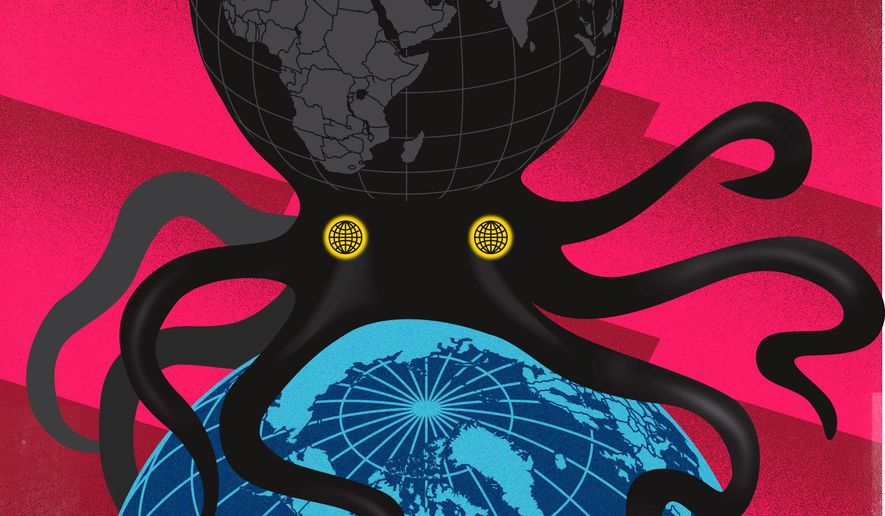Sanders, Omar Not Concerned About World's Most Oppressive Empires
By Clifford D.
WashingtonTimes.com

Illustration on tyranny
around the globe by
Linas Garsys/The
Washington
Tes
At a rally for Bernie Sanders in Minneapolis on Sunday, Rep. Ilhan Omar told a cheering crowd that she was excited to campaign for a presidential candidate who “will fight against Western imperialism and fight for a just world.”
What do you suppose she has in mind? Last I looked, Italian Somaliland and the Belgian Congo were long gone. Is she outraged that America is preventing Kim Jong-un from uniting the Korean peninsula?
I haven’t the foggiest. What I do know: Right now, people in Hong Kong, Iraq and Lebanon are putting their lives on the line in struggles against oppressive empire builders. Ms. Omar, Mr. Sanders and others who fancy themselves anti-imperialists show not the slightest concern for them.
Start with Hong Kong, a colony of the British Empire in the past, most of whose 7.3 million citizens vehemently oppose Hong Kong becoming a colony of the Chinese Communist Party in the future.
It’s often said that in 1997 Britain “handed sovereignty back to China.” It would be more accurate to say that Britain handed sovereignty to the ruling elite in Beijing, heirs to those who conquered China by force of arms, a regime that over recent decades has become increasingly despotic.
Beijing may have the muscle to subjugate Hong Kongers — as they do Tibetans and Uyghurs. But in a “just world,” wouldn’t governments require the consent of those they govern?
Move on to Iraq, where demonstrators by the tens of thousands have been protesting the ills caused by chronic corruption and economic mismanagement. They blame the Islamic Republic of Iran, which has been calling the shots — not just figuratively — since President Obama made the mistake of withdrawing American forces in 2011.
The theocrats in Tehran bribe and threaten Iraqi politicians, and instruct militias — euphemistically called Popular Mobilization Forces — whose snipers, stationed on rooftops, have been murdering protesters. Over recent days, hundreds of demonstrators have been killed.
Qassem Soleimani, commander of the Quds Force, responsible for the Islamic Republic’s military operations abroad, has been in Baghdad running high-level meetings, attempting to reorganize the government so it can more efficiently suppress demonstrations, and more obsequiously respond to his regime’s commands.
Protesters have been displaying pictures of both Gen. Soleimani and Iranian Supreme Leader Ali Khamenei, crossing out their images with thick red lines and beating them with shoes. In Karbala on Monday, protesters besieged the Islamic Republic’s consulate, pulling down Iran’s flag and raising Iraq’s.
Turn next to Lebanon. The Economist recently noted that more than a million of the country’s 5 million citizens have come out into the streets to express their “anger at a fossilized political class” that has run the country into the ground.
The newsmagazine neglected to inform its readers that by far the most powerful faction within that class is Hezbollah, which has a military wing stronger than the Lebanese Armed Forces. So what did the piece say about Hezbollah? Not a word.
A 1,500-word New York Times piece on Lebanon wasn’t much better. Six sentences from the end, Hezbollah is mentioned as one of the country’s “leading Shiite parties.”
The most likely explanation: Reporters based in Lebanon have been reluctant to acknowledge the extent to which the country has come to be dominated by a terrorist and global criminal organization funded and instructed by Tehran. To make plain that Hezbollah also is chiefly responsible for Lebanon’s deepening malaise could be hazardous to their health.
This is hardly the first time Lebanon has been convulsed by civil conflicts. What’s new is that the current uprising is not sectarian. On the contrary, Shia, Sunni, Christian and Druze appear to be coming together. They have been flying Lebanese flags, rather than those of sects and parties. And they have been targeting those they regard as quislings within their own communities.
A point most protestors are not making but I will: In addition to undermining Lebanon’s economy, Hezbollah threatens Lebanon’s national security. In 2006, Hezbollah started a war with Israel. Bloody as it was, it lasted only a month and the fighting was largely confined to the south of the country.
Since then, Hezbollah and its weapons — including an estimated 150,000 missiles — have spread throughout the country. If Hezbollah ignites another war — perhaps at Tehran’s request, perhaps due to miscalculation — battles will be fought far north of the Litani River.
In other words, the next war won’t be just between Israel and Hezbollah. It will be between Israel and Hezbollah-ruled Lebanon. And it will be devastating.
Inspired as I am to see the peoples of Hong Kong, Iraq and Lebanon fighting for their independence, I’m not confident they will win. Unlike Western imperialists of the 20th century, the rulers of the Chinese and Iranian empires are unlikely to respond to protests by quietly lowering their flags and going home.
Nevertheless, the free nations of the world should be implementing policies in support of those fighting 21st-century imperialism. At the very least, that means providing no financial assistance to governments controlled by terrorists or Communists.
One last question: Is there no enterprising reporter willing to ask Ms. Omar and Mr. Sanders what they mean by “Western imperialism,” how they plan to “fight” it, and whether they have any sympathy at all for those now resisting domination by non-Western empires? Their answers would be edifying — or maybe just entertaining.
• Clifford D. May is founder and president of
the Foundation for Defense of Democracies (FDD) and
a columnist for The Washington Times.

